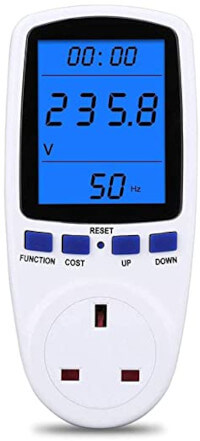Here in the UK, the energy regulator increased the price cap on household bills (gas and electricity) by 80%. The average bill will increase to £3,549 a year from this October. This price cap sees the price of electricity rise on average from 28p per kilowatt hour (kWh) to 52p. Half of UK households are facing fuel poverty this winter.
The UK is not alone in witnessing huge increases in the price of electricity. With more of the world plunged into fuel poverty, governments are urging households to reduce their energy consumption.
 When it comes to energy consumption in the home, there are many appliances which guzzle electricity. The biggest culprits of eye-watering electricity bills include the electric cooker, immersion heater, fridge, freezer, washing machine / dryer, dishwasher, electric heater, vacuum cleaner, iron, plasma TV; the list is seemingly endless.
When it comes to energy consumption in the home, there are many appliances which guzzle electricity. The biggest culprits of eye-watering electricity bills include the electric cooker, immersion heater, fridge, freezer, washing machine / dryer, dishwasher, electric heater, vacuum cleaner, iron, plasma TV; the list is seemingly endless.
Even simple changes to usage patterns can offer a significant reduction in bills. For example, cooking a meal in a microwave instead of an electric cooker will save more than a kWh each meal. Activities like washing clothes at 30 degrees C, reducing usage of the dryer and dishwasher, turning off lights will easily be visible in the number of kWh consumed in a month.
You’ve probably made significant reductions in the consumption of electricity already. But given that prices are forecast to continue to rise, it’s important to evaluate all electrical appliances to see what savings can be made. This series looks at ways to reduce your electricity consumption from computers and associated devices. While the series focuses on Linux, much of the material applies to whatever operating system you are running.
Before working out ways to reduce energy consumption from a computer and associated devices, we first need to identify current usage. Don’t be bamboozled by sites that use expensive multimeters. While they can measure standby power consumption over time with their high precision, you don’t need expensive kit. All that’s needed is a good quality power meter plug.
 We’ve tested a wide range of power meter plugs. On balance, we recommend the Mecheer power plug (available from Amazon) which costs around £20. [No affiliate links here, just use your favourite search engine, you’ll find it].
We’ve tested a wide range of power meter plugs. On balance, we recommend the Mecheer power plug (available from Amazon) which costs around £20. [No affiliate links here, just use your favourite search engine, you’ll find it].
Its accuracy is very good (checked with a multimeter), it has a very clear display with good backlight which makes it easy to read, and the device offers a variety of different functions. It doesn’t measure continuous power usage of appliances in standby or if an appliance is drawing less than 2 watts. But that’s not important, as it still measures accurately a device that is drawing a fraction of a watt. When a device is off or in standby it will consume a constant amount of power. Just use a calculator to work out the monthly usage in that situation.
You’ll often see headline stories about the cost of running a computer. Often extreme examples are quoted. For example, an estimate will look at the cost of running a high-end gaming laptop. They might assume that a high-end gaming laptop draws around 250w when gaming. In that situation, the cost per hour is 13p (using October 2022 price cap). With 2 hours of gaming a day, that equates to £95 a year (and that doesn’t reflect that the price cap is bound to rise at the next quarterly review).
You need to establish what your computer draws and then factor in how many hours it’s used a day. To illustrate why you shouldn’t base the cost on an illustrative figure, look at the table below. We’ve assumed a computer is used for 10 hours a day with light usage (i.e. not just left idle). For the final row, we’ll assume that the machine is used for intensive gaming for the whole 10 hours.
| Computer | Wh | Daily cost (£) | Annual Cost (£) |
|---|---|---|---|
| Single-board computer | 4 | £0.021 | £7.59 |
| Mini PC | 20 | £0.104 | £37.96 |
| PC with dedicated graphics card | 70 | £0.364 | £132.86 |
| PC with dedicated graphics card (intensive usage) | 250 | £1.300 | £474.50 |
As you can see, there’s a huge disparity. What matters is what your computer uses and whether you can reduce the Wh without affecting your productivity. Even small reductions in Wh will make a significant difference to the annual cost.
It’s important to also factor in the electricity consumed by connected devices such as a monitor, external hard disk, router, and other devices.
Summary
Computers are often on for many hours each day and therefore while they don’t consume much electricity per hour, when you factor in the number of hours the costs can still mount up.
First it’s important to measure the actual running cost of your computer, and not one based on an illustrative example. Get a power meter, use your computer as normal over a day, and see how many Wh it’s consumed.
In the next part of this series, we’ll look at ways you can reduce the electricity footprint.
All articles in this series
| Saving Money with Linux | |
|---|---|
| Getting Started | We kick off the series with everything you need to start saving |
| Power Settings | We look at the 3 different power settings and some useful open source tools |
| BIOS | Explore changing settings in the BIOS to reduce power consumption |
| PowerTOP | Analyze power issues and receive optimization suggestions |
| Computer Off | Power consumption when computers are off |
| Gaming | Gaming doesn't have to be energy intensive |

My computer takes about 1.5 Wh when off. It’s got a fairly old motherboard which is probably the reason.
Wh is energy. It depends on the time it is running!
Well done Einstein
Just a sponsored worthless text.
You are wrong, the series is not sponsored by anyone.
I’m in the UK too and dreading the planned hike in the electricity charge from October. Given the recent announcement that gas supplies to Europe are going to be even more restricted going forward, it seems very likely the charge will be even more crippling by the time the next price cap is reviewed.
My Linux boxes are each idling at around 30-35w according to a power meter. And under full load they are about 110w. I’ll need to cut down or turn one of them off I guess.
Wrgan is a troll. Just ignore him.